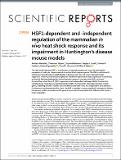HSF1-dependent and -independent regulation of the mammalian in vivo heat shock response and its impairment in Huntington's disease mouse models
Author(s)
Neueder, Andreas; Gipson, Theresa A.; Batterton, Sophie; Lazell, Hayley J.; Farshim, Pamela P.; Paganetti, Paolo; Bates, Gillian P.; Wasylenko, Theresa Anne; Housman, David E; ... Show more Show less
Downloads41598-017-12897-0.pdf (7.331Mb)
PUBLISHER_CC
Publisher with Creative Commons License
Creative Commons Attribution
Terms of use
Metadata
Show full item recordAbstract
The heat shock response (HSR) is a mechanism to cope with proteotoxic stress by inducing the expression of molecular chaperones and other heat shock response genes. The HSR is evolutionarily well conserved and has been widely studied in bacteria, cell lines and lower eukaryotic model organisms. However, mechanistic insights into the HSR in higher eukaryotes, in particular in mammals, are limited. We have developed an in vivo heat shock protocol to analyze the HSR in mice and dissected heat shock factor 1 (HSF1)-dependent and-independent pathways. Whilst the induction of proteostasis-related genes was dependent on HSF1, the regulation of circadian function related genes, indicating that the circadian clock oscillators have been reset, was independent of its presence. Furthermore, we demonstrate that the in vivo HSR is impaired in mouse models of Huntington's disease but we were unable to corroborate the general repression of transcription that follows a heat shock in lower eukaryotes.
Date issued
2017-10Department
Koch Institute for Integrative Cancer Research at MITJournal
Scientific Reports
Publisher
Nature Publishing Group
Citation
Neueder, Andreas et al. “HSF1-Dependent and -Independent Regulation of the Mammalian in Vivo Heat Shock Response and Its Impairment in Huntington’s Disease Mouse Models.” Scientific Reports 7, 1 (October 2017) © 2017 The Author(s)
Version: Final published version
ISSN
2045-2322